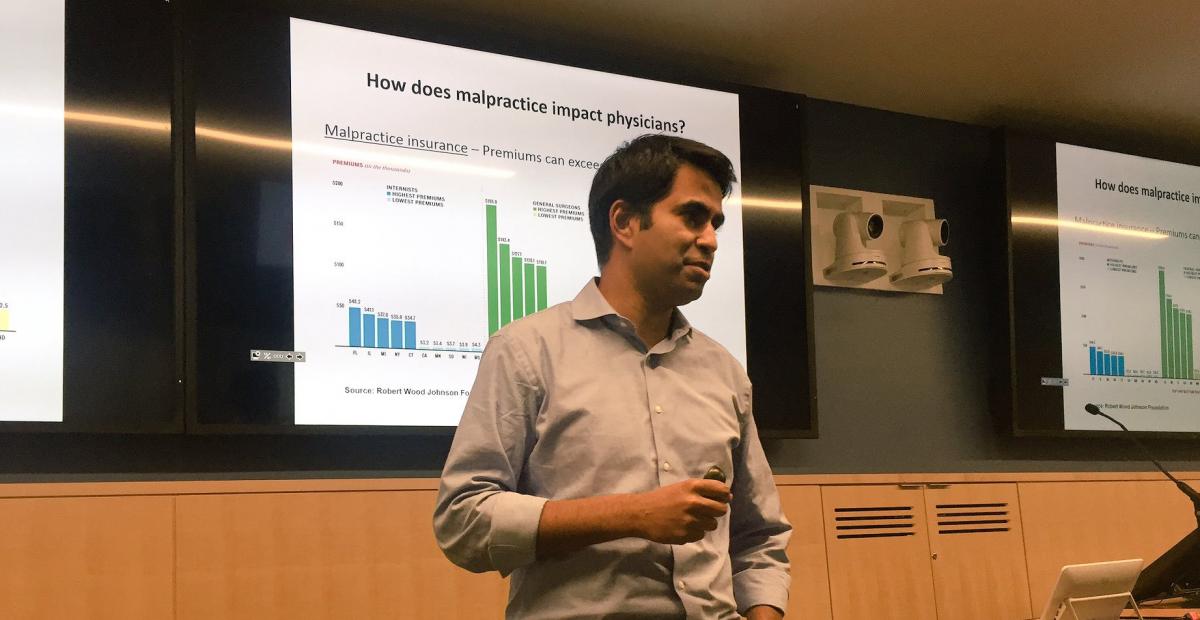
The world of health care is vast and ever-changing. The realm of a doctor’s world is much larger than an examination room with one patient. Doctors must be familiar with health care delivery systems, financing, medical ethics, population health, and professionalism. Their knowledge must extend beyond what textbooks can teach and reach into the real world of interacting with health care policies and treating real patients.
In 1999, Ridley Watts Professor and department head Barbara J. McNeil, MD, PhD, and 30thAnniversary Professor of Health Care Policy Haiden Huskamp, PhD, realized that key lessons relating to health care policy were not being taught at Harvard Medical School. Together, they created a curriculum that educated students on the real-world aspects of being a doctor, and the health care policy course was born.
In the beginning, this course was called HC 750: Health Care Policy. It covered the basics of the health care system and taught students how to deal with finances related to health care and how to be good advocates for patients. Students were taught the best ways to inform patients of what was available for them through their health care provider and how much it would cost. They were given examples of what health policy related situations they may encounter when taking care of patients, and how to best deal with them. This course started as an elective, but soon became a required course for all medical students.
In 2006, the department joined with the ethics, social medicine, and clinical epidemiology departments to create a new course. Each department drew from the courses they already taught to design a course that combined all of these disciplines. Thus, HC 750 Health Care Policy transformed into Essentials of the Profession.
Essentials of the Profession covers key concepts important to the practice of medicine and to medical professionalism. Originally, students took Essentials of the Profession during their first year of medical school. Eventually, the course evolved into a two part course. Students now take the first one-month part of the course as first year medical students, and then the second part in their third year of medical school after they have completed their principal clinical year. Health care policy professors work collaboratively with the other departments to coordinate the curriculum for these courses.
Year one of Essentials of the Profession teaches students the fundamentals of health policy using a “flipped classroom” approach. Students participate in lectures, small group breakout sessions, and lunches with prominent figures in health care. They explore topics such as insurance markets, Medicare and Medicaid, benefit design, and value. Students are taught about individual patient care as well as population health approaches. They learn about the key characteristics of the U.S. health care system as well as recent reforms. They apply perspectives of social science to understand the role of medicine, the challenges faced by the field of medicine, and possible solutions. Students are introduced to the social, economic, and political forces that affect both the burden of disease and the ability of health care to improve patients’ lives.
The second part of the course, taken in the third year of medical school, leverages students’ clinical experiences to improve their understanding of health policy issues and how those issues come to bear in clinical practice. Students cover topics such as mental health and substance use, policy review, patient safety, and pharmaceutical regulation. They interpret medical evidence and their role as physicians in public health emergencies. Using their experiences from their clinical year, students discuss medical ethics and professionalism, as well as explore innovations in primary care.
Many health care policy faculty have taken part in the Essentials of the Profession courses throughout the years. Currently, the first section of Essentials of the Profession is being led by associate professor of health care policy Ateev Mehrotra, MD, MPH and professor of health care policy and medicine, Nancy Keating, MD, MPH. The second half of Essentials of the Profession is being taught by Ruth L. Newhouse Associate Professor of Health Care Policy Anupam B. Jena, MD, PhD, and professor of health care policy Bruce Landon, MD, MBA.